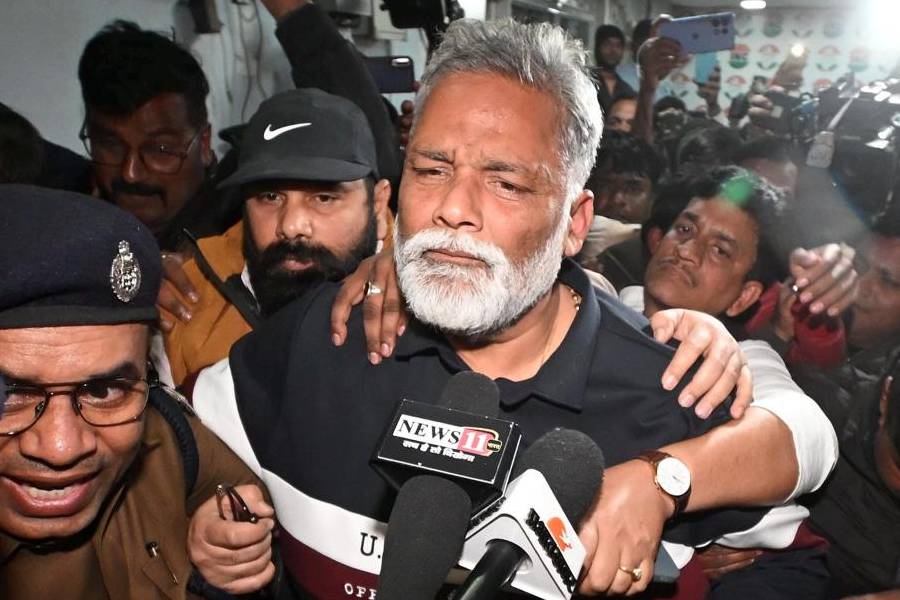
This column focuses on society and politics, since I know those subjects somewhat better than economics. Besides, economists rarely agree with one another anyway. Of the three experts on the economy I count as friends, one is strongly against the obliteration of the existing 500 and 1000 rupee notes by the prime minister, Narendra Modi, and has said so publicly. The second is strongly in favour of the move, and has said so publicly as well. As for the third, he refuses to take sides, saying merely (and wisely) that since the policy has never before been tried in a moderate-inflation, high-growth scenario, we can't say how it will turn out in the long run.
It may take several years before we know whether this abrupt withdrawal of Rs 500 and Rs 1000 notes will be a boon to the Indian economy. Yet, in the mere month that it has been in operation, we can see that this demonetization has had a mostly negative impact on the institutional life of the republic. This is because the decision was the work of one man alone, with the prime minister's imprint being so strong that history may well come to know this policy as Namo's Demo.
Consider first, the consequences of Namo's Demo for the institution that Modi himself described as "the temple of democracy" shortly after being elected prime minister, namely the Indian Parliament. It has been claimed that had Parliament been taken into confidence beforehand, black marketeers would have been forewarned. For demonetization to have an impact it had to be sudden and unanticipated. Fair enough, but why didn't the prime minister take the opportunity to explain and defend the withdrawal of Rs 500 and Rs 1000 notes in Parliament soon after it was announced? Since this was a move that directly affects every Indian, surely that was the least the prime minister owed the only institution that directly represents every Indian.
It is now close to a month since Namo's Demo hit the ground, hard but apparently not running. In this time, the prime minister has made a few brief appearances in Parliament, but declined to speak or participate in a debate. While refusing to engage with the Opposition in Parliament, he has made ad hominem remarks about them elsewhere, accusing MPs who oppose demonetization of being corrupt crooks themselves.
Some Opposition MP's complained that even as the prime minister was refusing to speak in Parliament, he found time to address the crowd in a rock concert in Mumbai. I myself think that his true contempt for Parliament was manifest far more in the 'poll' he conducted using the Narendra Modi App. Getting a high 'approval rating' from his followers for demonetization may have satisfied the prime minister's vanity. Yet it further undermined the role and credibility of Parliament. By refusing to engage with elected MPs, while seeking to build a direct link with his admirers, the prime minister wilfully defiled an institution that he had himself once compared to a shrine. Even if he now belatedly chooses to speak or engage in a debate in Parliament, the damage has been done.
The prime minister's supporters have blamed the Opposition for repeatedly disrupting Parliament and for making what they see as unreasonable demands (such as a debate under a voting clause). However, that the Opposition disrespects Parliament is no excuse for the prime minister do likewise. A degraded Parliament must be restored, not damaged further.
The second institution that Namo's Demo has further undermined is cabinet government. Unlike the president of the United States of America, the prime minister of India is merely first among equals. He is supposed to take decisions after consultation with his cabinet colleagues. Yet (like other of Modi's decisions in the past) this decision was undertaken unilaterally, with ministers merely asked to go along. Indeed, in a sign of how little the prime minister trusts his own cabinet, he apparently demanded that ministers leave their mobile phones outside, before entering the room where they were told of demonetization.
The prime minister's disregard of parliamentary procedure has been criticized inside and outside Parliament. But his contempt for government through consultation has been willingly, not to say cravenly, accepted by the cabinet itself. Senior cabinet ministers are content to be merely His Master's Voice. Indeed, they consider it an honour, falling over themselves to broadcast to the nation how grateful they are to serve under a prime minister destined to bring glory to India.
Representative in this regard is a piece published in a New Delhi newspaper by M. Venkaiah Naidu, the Union minister for urban development and for information and broadcasting. This began by claiming that Namo's Demo was part of "the grand 'cultural revolution' the PM is working on". According to Naidu, all that previous prime ministers had done was to create a "decadent culture" of "corruption, opportunism, nepotism, greed, repression (remember Emergency?), exploitation of power, sycophancy and self-seeking behaviour". (This "decadent culture" gave us a unified India, parliamentary democracy, constitutional safeguards for linguistic and religious pluralism, equality before the law for Dalits and women, the IITs and IIMs, the Green, White and IT Revolutions, the space programme, and much else - but let that pass). All this dirt and decadence was, Naidu assured us, now being washed aside by the "grand cultural revolution" that the current prime minister was ushering in, which "impinging on all walks of public and private life amounts to shaking up the system. It ranges from attending office on time, keeping working and living environments clean, accountability, transparency, technology adoption, innovation, etc." These new initiatives, claimed Venkaiah Naidu, "will soon transform India, erasing the legacy of the old decadent order and Modi will emerge as the tallest leader in post-Independence India".
The invocation of the Emergency was interesting, and perhaps also unfortunate. For one thing, between 1975 and 1977 people did attend office on time - and trains ran on time too. For another, one has to go back to 1975 to recall a cabinet minister speaking as sycophantically about his prime minister as Naidu now does of his. Nor is he alone. This regime has plenty of Devakanta Baruas.
To be sure, Modi's predecessor as prime minister, Manmohan Singh, also damaged the institution of Parliament, by refusing to contest for a Lok Sabha seat, and of cabinet government, by often taking instructions from someone who was not even a minister, namely Sonia Gandhi. Modi has further eroded trust in these institutions, albeit in very different ways.
A third institution whose reputation has suffered since Namo's Demo is the Reserve Bank of India. Unlike Parliament or the cabinet, the RBI previously enjoyed high credibility. Indeed, it was one of only two major public institutions in whose fairness and independence the Indian public had almost total trust - the other being the Election Commission of India.
The RBI's last governor, Raghuram Rajan, zealously guarded the Central bank's autonomy. When he was denied a second term, it was widely speculated that the government wanted someone more malleable. The manner in which Namo's Demo was conducted further strengthens this speculation. Rajan had himself publicly expressed reservations about hasty demonetization; had he been in office, he would surely have urged proper planning and more careful implementation.
One does not know whether Rajan's successor as RBI governor was consulted before Namo's Demo was decided upon. (The fact that the RBI has since taken so long to replace the currency taken out of circulation suggests that he was not.) What we do know is that he has stayed largely silent since, so much so that a full two weeks after the Rs 500 and Rs 1000 notes were taken out of circulation, one respected business journal asked, "Has Anyone Seen India's Central Bank Governor?" Meanwhile, finance ministry officials have been issuing a series of different notifications about currency, day after day, those coming later cancelling those that came earlier, a further trespassing into the domain of the RBI.
I leave it to the economists to argue the merits of taking those high denomination notes abruptly out of circulation. As a student of Indian democracy, however, it seems evident that Namo's Demo is set to further harm our already imperfect and fragile institutions. Parliament has become even less of a theatre for reasoned debate than it has been in the past. The office of prime minister, excessively weakened by Manmohan Singh, has now become far too strong for its own good (and ours). There will not (as I shall never tire of repeating) be another Emergency, yet Modi is undeniably the most authoritarian prime minister since Indira Gandhi, akin to her in cultivating devotion and worship from even (or especially) his own cabinet ministers. Finally, the RBI, once justly admired for its autonomy and impartiality, has become a pawn in the hands of the ruling government.
Its institutional costs aside, Namo's Demo has also further contaminated our already polluted public discourse. The prime minister has led the way, by repeatedly suggesting that only crooks and criminals can be opposed to the withdrawal (without notice) of Rs 500 and Rs 1000 notes. This politics of insinuation and innuendo has been energetically taken forward by his cabinet ministers, and by his followers on social media, who, I can be sure, will meet my arguments in this column not by counter-arguments, but with abuse.











